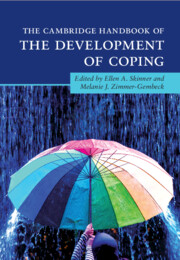Book contents
- The Cambridge Handbook of the Development of Coping
- Cambridge Handbooks in Psychology
- The Cambridge Handbook of the Development of Coping
- Copyright page
- Contents
- Contributors
- Preface
- 1 A Systems Perspective on the Development of Coping
- Part I Theoretical Perspectives on the Development of Coping
- Part II Methods for Studying the Development of Coping
- 6 Capturing Coping
- 7 Resilience and Coping in Development
- Part III Neurophysiological and Experiential Bases of the Development of Coping
- Part IV Psychological Foundations of the Development of Coping
- Part V Social Contexts and the Development of Coping
- Part VI Application and the Development of Coping
- Index
- References
7 - Resilience and Coping in Development
Pathways to Integration
from Part II - Methods for Studying the Development of Coping
Published online by Cambridge University Press: 22 June 2023
- The Cambridge Handbook of the Development of Coping
- Cambridge Handbooks in Psychology
- The Cambridge Handbook of the Development of Coping
- Copyright page
- Contents
- Contributors
- Preface
- 1 A Systems Perspective on the Development of Coping
- Part I Theoretical Perspectives on the Development of Coping
- Part II Methods for Studying the Development of Coping
- 6 Capturing Coping
- 7 Resilience and Coping in Development
- Part III Neurophysiological and Experiential Bases of the Development of Coping
- Part IV Psychological Foundations of the Development of Coping
- Part V Social Contexts and the Development of Coping
- Part VI Application and the Development of Coping
- Index
- References
Summary
Concepts of resilience and coping have a shared history rooted in efforts to understand how individuals adapt to challenging or stressful experiences. Yet, there are notable differences in these two traditions of research. This chapter examines conceptual similarities and divergences in research traditions on resilience and coping. We highlight the general neglect of culture and context in early research on both concepts and draw attention to recent efforts focused on understanding how coping and resilience processes operate in sociocultural context. Finally, we offer suggestions for aligning these two traditions of research to move toward a more comprehensive framework spanning levels of analysis and disciplines. Integrating these two traditions of research has the potential to advance understanding of how interconnected adaptive systems promote and protect human development and health, providing evidence to guide practice and policy in the face of complex multisystem challenges now confronting human life and development.
- Type
- Chapter
- Information
- The Cambridge Handbook of the Development of Coping , pp. 183 - 204Publisher: Cambridge University PressPrint publication year: 2023
References
- 1
- Cited by

